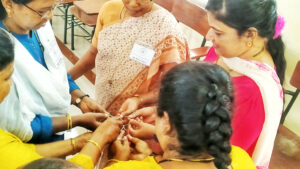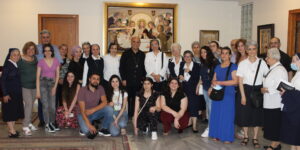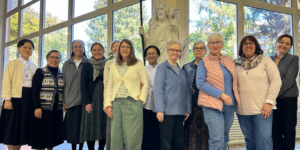Sr. Mirjam Beike was born in Frankfurt, Germany. She entered the Congregation of the Sisters of the Good Shepherd in München, Germany, in 1988, making her temporary profession in Zinneberg, Germany, in 1992 and her final profession in Bad Honnef, Germany, in 1997. Since 2018, she has been based in Geneva working as a member of the Good Shepherd International Justice and Peace Office, from where she will arrive come to take up her new role.
Where did your journey to the Congregation begin?
I’m from a region in Germany that is very Protestant, so the way Catholic congregations then made themselves known was by advertising in the local press. One day, in my late teens, a friend gave me some home-grown vegetables to take back to my family. As I unwrapped the newspaper that she had used to protect them, I noticed an article about the World Day of Prayer for Vocations. Among the many vocation promotion advertisements was one for the Sisters of the Good Shepherd. The advert showed a girl sitting on the street with the accompanying words: “who really helps her?”. The image and the question struck me to my core. Since my teenage years, I had seen the girls living on the streets around Frankfurt’s train station who were involved in prostitution to earn money for drugs.
From the advert, I presumed that the ministry and charism of the Congregation must respond to the question posed; to help and offer accompaniment to these girls. It was a ministry that touched me profoundly and one that called me to take action.
I wrote to the sisters for more information and was able to begin to respond to this call to action when, during my initial discernment journey before I entered the Congregation, we were brought to the street girls around the train station in Frankfurt to encourage them to access the support services of the government.
How have you continued to respond to this call to action through your ministries as an apostolic sister?
After I joined the Congregation, I was very fortunate to have been able to train and qualify as a social worker. While working in this profession as a sister in Germany, I engaged with a range of service user groups. I worked with those who had been trafficked into Germany, either willingly or forcibly, to look at their options for repatriation or settlement; I supported girls and women to access benefits; I encouraged minors to stay in education and focus on their career; and I was even able to re-connect with my vocation ministry by supporting street girls while working with Caritas in Cologne, Germany.
In 2009, I was one of the founding members of our new mission in Albania. Based in the country’s capital city of Tirana, I collaborated with a non-profit agency that works to combat human trafficking. I also supported the work of the Redemptorist Priests with parish activities. While there, I was assisted by Sr. Olga Cristobal from the Province of Mid-North America. In return, I supported her outreach efforts to engage with the Filipino community.
Picture One: Sr. Mirjam Bieke helps to prepare children in Kamez, Albania, for their First Holy Communion.
Since 2018, this call to action has taken the form of working in Geneva as a member of the Good Shepherd International Justice and Peace Office Team.
Can you share something about being based in Geneva and working as part of this team?
Working in Geneva has been a privileged opportunity to be involved with the valuable work carried out by Sr. Winifred Doherty and Alexis Schutz in New York and the rest of the GSIJP Office Team based around the globe.
When I arrived in Geneva, it became quickly apparent that there was a lot going on. So many meetings and events on an endless number of human rights and social justice issues. Although all worthy and of interest, I realized that – with working alone – going from event to event might not achieve outcomes. So I decided it would be best to focus my efforts on a small number of issues.
The principal issue I decided to focus on was human trafficking. Not simply because of my previous ministries but also because of the Congregation’s work on the issue. And in time, I established my presence and developed my role on this issue. Thankfully, sharing office space with five other congregations at Franciscans International allowed me to make the connections and enter into the networks necessary to achieve outcomes. As a result, GSIJP Office input is now highly regarded.
Over these years, I’ve submitted numerous oral and written statements and spoken at many events. Of specific importance, I’ve developed university webinars with the Ambassador of the Order of Malta, co-signed statements about violence against women in South Africa with the NGO Edmund Rice International, and worked with the Special Rapporteur on trafficking in persons, especially women and children.
My involvement has sharpened the profile of our Congregation in the international arena, enabling me to showcase our influential Position Papers on the global stage.
What role have the Congregation’s Position Papers played in your work?
Our updated Position Papers of 2018 have allowed us to focus and clarify our identity. In addition, these documents serve as a tool toward relevant development of programs, policy, and advocacy in the six main areas in which we are involved and give us a common direction for action.
The documents have offered me the advantage of speaking clearly about the stance and direction of our Congregation on so many issues. For example, on prostitution as violence against women or the prosecution of those who purchase sex. From my experience, most other Catholic NGOs are not able to speak so clearly about their stance on some of these issues. They are indeed a fantastic resource for us from grassroots to UN level.
Is there anything additional you want to add about your expectations as you embark on the next six years?
Yes, I’d finally like to add that I’m deeply convinced that it is not we, the Congregational Leadership Team, who are to do any transformation. Instead, I see our role as one of being here to accompany the transformation that is evolving from each sister within the Congregation.
We are here to accompany and listen to the needs of the sisters. Our role is to try to develop the way forward as transformation takes place together with the sisters – but we cannot do the transformation. We are like midwives who are here to support the birth of the child who wishes to be born. This demands a lot of listening and, in return, asks of the sisters to trust us.






